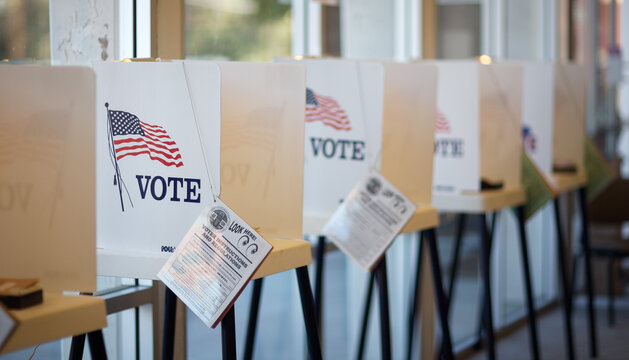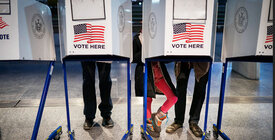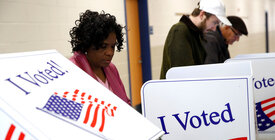Click here for the most recent Voting Laws Roundup.
This roundup looks back on voting laws enacted in 2023 and looks forward to the voting landscape in 2024 based on legislation already pending. In 2023, we once again saw an unprecedented volume of state legislation changing the rules governing voting. There remains a stark divide: 14 states passed restrictive voting laws while others moved to implement changes to make voting more accessible. All told, states enacted more restrictive laws and more expansive laws in 2023 than in any year in the last decade except for 2021, which was itself an unprecedented year. Early indicators for 2024 suggest more of the same.
Looking Back at 2023
Between January 1 and December 31, 2023, at least 14 states enacted 17 restrictive voting laws,1 all of which will be in effect for the 2024 general election.2 At least one of these laws made it harder to vote in several different ways.
Voters in these states now face additional hurdles to reach the ballot box. Most of the restrictions limit mail voting, such as requiring additional information on a mail ballot application, shortening the window to request a mail ballot, or banning drop boxes.
At least 6 states enacted 7 election interference laws,3 with at least 6 laws in effect for the 2024 elections.4 Many create criminal penalties for election workers for minor mistakes such as not allowing a poll watcher to stand close enough to voters.
At the same time, at least 23 states enacted 53 expansive voting laws,5 all but two of which will be in effect for the 2024 general election.6 Many voters will now have access to a simpler process for registering to vote, greater access to absentee ballots, a simpler process for reclaiming their right to vote after a conviction, and/or increased access to assistance for voters who need it.
This year brings the first presidential election since lies about the 2020 election initiated a wave of restrictive voting laws and election interference laws. Voters in 18 states7 face for the first-time restrictions that have been enacted since 2020. Because some laws passed in 2021 or 2022 either did not go into effect before the 2022 midterms or were temporarily blocked by a court but are now in effect, the number of states in which voters will face restrictions for the first time is higher than the 14 restrictive laws enacted in 2023. Voters in 27 states8 will face restrictions in the 2024 election that they’ve never experienced in a presidential election before (some of these laws were in effect in the 2022 midterms). Also in 2024, 5 states9will have new election interference laws in place. For 13 states,10 this will be the first presidential election year in which such laws are in effect (some of these laws were in effect in 2022).
Looking Ahead to 2024
In some states, legislators were able to begin filing bills last December for consideration in this year’s session, which is called “pre-filing.” Additionally, many bills that were introduced but not passed last year are still before the legislature for consideration this year, or “carry over.” Some of the pre-filed bills and carryovers may become law this year and impact voters; pre-filed bills in particular tend to be among legislators’ top priorities for the year. As of December 31, 2023, 25 states had a pre-filed bill or a carryover that would make it harder to vote. The same number of states have expansive legislation, although the number of expansive bills is about twice as large. While the number of pre-filed and carryover expansive bills outpaces that of restrictive bills, voters in states passing restrictive laws will face new hurdles to vote regardless of what happens elsewhere in the country.
Endnotes
-
1
AR H.B. 1411, FL S.B. 7050, ID H.B. 124, ID H.B. 340, IN H.B. 1334, KS S.B. 106, MS H.B. 1310, MS S.B. 2358, NC S.B. 747, ND H.B. 1431, NE L.B. 514, NM S.B. 180, SD H.B. 1165, TX S.B. 924, UT S.B. 17, WY H.B. 279, WY S.F. 153. Legislation is categorized as restrictive if it contains one or more provisions that would make it harder for eligible Americans to register, stay on the voter rolls, or vote as compared to existing state law. -
2
MS S.B. 2358 has been partially blocked by a federal court as it applies to voters with disabilities, but the state has appealed. Portions of FL S.B. 7050 were temporarily blocked by a federal court, but some restrictive provisions remain in effect. The state has appealed. -
3
AR H.B. 1411, AR S.B. 272, FL S.B. 4-B, GA S.B. 222, NC S.B. 749, SD H.B. 1165, TX S.B. 1933. Legislation is categorized as interference if it either threatens the people and processes that make elections work or increases opportunities for partisan interference in election results or administration. -
4
NC S.B. 749 has been temporarily blocked by a state court, but the state has appealed. -
5
AR H.B. 1512, AR S.B. 247, CA A.B. 292, CA A.B. 545, CA A.B. 626, CO S.B. 276, CT H.B. 5004, CT H.B. 6941, GA S.B. 129, IL S.B. 2123, KS S.B. 221, LA H.B. 449, ME L.D. 886, MD H.B. 410, MI H.B. 4567, MI H.B. 4568, MI H.B. 4569, MI H.B. 4570, MI H.B. 4697, MI H.B. 4699, MI H.B. 4983, MI S.B. 259, MI S.B. 367, MI S.B. 370, MI S.B. 373, MI S.B. 594, MN H.F. 3, MN H.F. 28, NV A.B. 286, NV S.B. 216, NV S.B. 327, NJ A.B. 5175, NM H.B. 4, NM S.B. 180, NY A.B. 4009, NY A.B. 7690, NY S.B. 1733, NY S.B. 1327, NY S.B. 5984, NY S.B. 7394, OR H.B. 2107, OR S.B. 166, TX H.B. 1217, TX S.B. 477, TX S.B. 1599, UT H.B. 37, UT S.B. 17, VA H.B. 1948, WA H.B. 1048, WA S.B. 5112, WA S.B. 5208, WV S.B. 631, WY H.B. 79. Legislation is categorized as expansive if it contains one or more provisions that would make it easier for eligible Americans to register, stay on the voter rolls, or vote as compared to existing state law. -
6
MI H.B. 4983 and MI S.B. 594 do not take effect until June 30, 2025. The provisions of NM H.B. 4 that expand automatic voter registration do not take effect until July 1, 2025. -
7
Arkansas, Florida, Idaho, Indiana, Kansas, Mississippi, Nebraska, New Hampshire, New Jersey, New Mexico, North Carolina, North Dakota, Ohio, Oklahoma, South Dakota, Texas, Utah, and Wyoming. -
8
Alabama, Arizona, Arkansas, Florida, Georgia, Idaho, Indiana, Iowa, Kansas, Kentucky, Mississippi, Missouri, Montana, Nebraska, New Hampshire, New Jersey, New Mexico, New York, North Carolina, North Dakota, Ohio, Oklahoma, South Carolina, South Dakota, Texas, Utah, and Wyoming. -
9
Arkansas, Florida, Georgia, South Dakota, and Texas. North Carolina would be one of these states, but its new interference law, S.B. 749, has been temporarily blocked by a state court. -
10
Alabama, Arizona, Arkansas, Florida, Georgia, Iowa, Kansas, Kentucky, Missouri, North Dakota, Oklahoma, South Dakota, and Texas.




